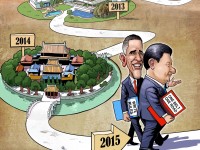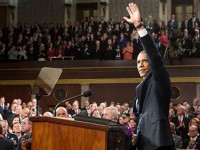Zhou Wenzhong, Secretary-General of Boao Forum for Asia
Jun 01, 2015
As China’s economy and interests continue to grow, Beijing will uphold its sovereignty, security and development interests and will assume a bigger role in regional and global affairs. President Xi’s upcoming visit is another opportunity for Americans to appreciate that China’s actions are targeted at the US and its allies.
Ben Reynolds, Writer and Foreign Policy Analyst in New York
Apr 27, 2015
Hilary Clinton’s established perspective on U.S.-China relations as the face of the “Pivot to Asia,” does not bod well for the bilateral relationship, writes Ben Reynolds. The existing Clinton ties with the Center for New America Security (CNAS), a hawkish, pro-interventionist think tank, further the claim that U.S. militaristic hegemony will continue to be the foreign policy toward China.
Stephen Harner, Former US State Department Official
Apr 22, 2015
The Obama administration’s “rebalance to Asia” policy launched in 2010 has turned toward militaristic power-based containment rather than engagement. The Council of Foreign Relations has suggested that the U.S. boost military budgets with its allies, and diminish trade with China, a dangerous and misguided strategy that resembles Cold War tactics.

Joseph S. Nye, Professor, Harvard University
Mar 10, 2015
The challenges that face the world is not a due to a transition of power among states, but a diffusion of power away from governments. Nye argues that for a “new type of major power relations,” the U.S. needs to avoid containment as a strategy, and China must accept the legitimacy of American presence in the Western Pacific.

Zheng Yu, Professor, Chinese Academy of Social Sciences
Feb 06, 2015
Rather than focusing on military containment, Obama made it clear that economic competition is a priority of the U.S. It isn’t entirely negative if China and the U.S. increase economic competition, with economic interdependence dictating increased pressure for economic and technological advancement and cooperation.
Curtis S. Chin, Former U.S. Ambassador to Asian Development Bank
Jan 28, 2015
The recent State of the Union speech by President Obama didn’t underscore the critical importance of strengthened U.S. – Asia cooperation and engagement. Curtis Chin suggests that Obama could have more clearly clarified the Pivot to Asia, security issues in the South China Sea, and that increasingly America’s security and prosperity is linked to China and Asia.
Stephen Harner, Former US State Department Official
Jan 26, 2015
The “Pivot to Asia” policy has been primarily driven by cold war and military conceptions of containing China’s rise. President Obama’s recent State of the Union speech kept with a distinctly American theme of soft-imperialism with mention of “writing the rules” to free trade agreements in Asia, instead of acknowledging China’s own sovereignty.
Wu Zurong, Research Fellow, China Foundation for Int'l Studies
Jan 22, 2015
It is my hope that the Obama administration will leave a satisfactory legacy in promoting US-China relations by enhancing mutual strategic trust and pragmatic cooperation between the two nations.
Dan Steinbock, Founder, Difference Group
Jan 16, 2015
In 2013, the Sino-US relations ended with concern over strategic mistrust. In 2014, bilateral relations were characterized by a sense of optimism. While bilateral trust may endure through the Obama era, challenges will ensue thereafter.
Cui Liru, Former President, China Institutes of Contemporary International Relations
Jan 14, 2015
Cui Liru describes a transforming international picture of national power relations, one that is moving toward a multipolar world of influence. In order to avoid the possibilities or true confrontation, China must more clearly realize what it wants to achieve in the world, and also needs to imagine what a peaceful coexistence with the U.S. would look like.
Back to Top

- China-US Focus builds trust and understanding between the U.S. and China through open dialogue among thought leaders.
- Our Offerings
- Topics
- Videos
- Podcasts
- Columnists
- Research Reports
- Focus Digest
- Stay Connected
-
Thanks for signing up!
- Get the latest stories from China-US Focus weekly.